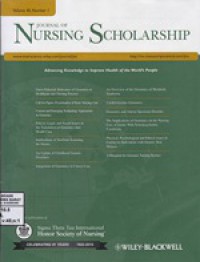
Jurnal
Parental Influences of Sexual Risk Among Urban African American Adolescent Males
Purpose: This study examined the influence of parental marital status, parent-child sexual communication, parent-child closeness on the HIV-related knowledge, safer-sex intentions, and behaviors of late adolescent urban African American males. Design: The study employed a cross-sectional design with retrospective recall of salient parental influences and behaviors. Methods: Data were collected via paper-and-pencil questionnaire from 134 late adolescent African American males, 18 to 22 years of age, recruited from urban communities in and around Boston, Massachusetts. Data were analyzed using bivariate correlations, paired t tests, and regression modeling. Findings: Young men reported greater amounts of sexual communication with mothers than fathers (p < .001). Parent-child closeness was positively correlated with amount of parent-child sexual communication with both mothers and fathers (p < .001 for both). Parent-child closeness was, in turn, associated with greater condom use self-efficacy (p < .01), less permissive sexual attitudes (p < .001), fewer sexual partners (p < .01), and less unprotected sex (p < .01). Greater amounts of parent-child sexual communication were associated with fewer sexual risk behaviors, more consistent condom use, and greater intentions to use condoms in the future. There was evidence that parental influences on sexual risk behaviors and condom use intentions were mediated through young men’s condom use self-efficacy, attitudes, and beliefs. Conclusions: These findings highlight the importance of the parent-child relationship and the role of parent-child communication between parents and sons. Further studies are needed to better understand the nature of father-son communication and develop strategies to help parents communicate effectively with sons. Clinical Relevance: Evidence has shown that African American adolescent males are more likely to engage in high-risk sexual behaviors. Understanding the sexual risk communication between African American adolescent males and their parents is important to developing strategies in reducing sexual risk behavior.
Availability
No copy data
Detail Information
- Series Title
-
Journal of Nursing Scholarship, Volume 45, Number 2 2013
- Call Number
-
(05) 610.5 WIL j
- Publisher
- Malden : Wiley-Blackwell., 2013
- Collation
-
Hlm. 141-150
- Language
-
English
- ISBN/ISSN
-
1527-6546
- Classification
-
(05) 610.5 WIL j
- Content Type
-
-
- Media Type
-
-
- Carrier Type
-
-
- Edition
-
Volume 45, Number 2
- Subject(s)
- Specific Detail Info
-
-
- Statement of Responsibility
-
-
Other version/related
No other version available
File Attachment
Comments
You must be logged in to post a comment
 Computer Science, Information & General Works
Computer Science, Information & General Works  Philosophy & Psychology
Philosophy & Psychology  Religion
Religion  Social Sciences
Social Sciences  Language
Language  Pure Science
Pure Science  Applied Sciences
Applied Sciences  Art & Recreation
Art & Recreation  Literature
Literature  History & Geography
History & Geography